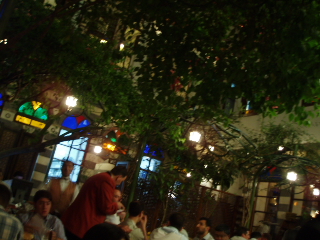Restaurants in Damascus
After exploring the Old City, we go back to Misao's place, where we meet her neighbour Sarah, a German girl studying Arabic. Three of us go to Sarah's favorite restaurant Al-Shami House for very early (by Syrian standards) dinner around 6 pm. No doubt there is almost no one but waiters in the restaurant.
There are quite a few restaurants in the Old City, and most of them seem to renovate 18th-century Damascene houses, characterised with the combination of a very sober facade and a magnificent courtyard inside with decorated walls, marble floors, a fountain in the centre and quite large trees with lush green leaves. Al-Shami House restaurant is no exception as seen below.


Tonight I order kafta. According to Lonely Planet, it is "made of minced lamb, onion, spices, topped with a tossed salad of parsley, onions, olive oil and sumac (a tangy, lemony spice)." What I'm served with is this:

It is actually an ordinary gratin with a minced lamb meatball (left) and an eggplant and onion ball (right). Probably this is arranged in Western style. But it doesn't matter as it's very delicious.
What's interesting about restaurants in Syria is that there is a complete division of labour. Guys taking orders only take orders; those serving drinks and dishes never take orders; and there are guys only in charge of charcoal for narghile. In general, they are very friendly - quite opposite to many restaurants in London.
Another good thing about restaurants in Syria is that your bill almost never exceeds 500 SP (US$10 or 5 UK pounds) for excellent meals - utterly different from London, where 5 pounds buy you only a sandwich and the average bill for mediocre (or terrible) dinner is 20 pounds. Tonight three of us pay 270 SP each.
But if you love drinking, you may not be happy with Syrian restaurants; many of them do not serve alcohol. Yes this is a Muslim country. Even Damascus is quite conservative. As I'm not so keen to drink, I don't care about this respect, though.
Tonight I try narghile - what's called shisha in (probably) Egypt. As I'm not a smoker, I'm unable to enjoy this nicotine-free smoking. But almost every Syrian in any restaurant seems to have a chat over narghile after dinner.
Over delicious meals, by the way, Sarah, a relatively devout Christian, explains the difference between Christianity and Islam, something that non-religious Japanese people are not familiar with at all. I understand why these two groups of people don't understand each other. By definition, each religion denies the other: both believe that there is only one God; and the God each of them believes in is different from each other. They get upset by the other's belief very understandably.
There are quite a few restaurants in the Old City, and most of them seem to renovate 18th-century Damascene houses, characterised with the combination of a very sober facade and a magnificent courtyard inside with decorated walls, marble floors, a fountain in the centre and quite large trees with lush green leaves. Al-Shami House restaurant is no exception as seen below.


Tonight I order kafta. According to Lonely Planet, it is "made of minced lamb, onion, spices, topped with a tossed salad of parsley, onions, olive oil and sumac (a tangy, lemony spice)." What I'm served with is this:

It is actually an ordinary gratin with a minced lamb meatball (left) and an eggplant and onion ball (right). Probably this is arranged in Western style. But it doesn't matter as it's very delicious.
What's interesting about restaurants in Syria is that there is a complete division of labour. Guys taking orders only take orders; those serving drinks and dishes never take orders; and there are guys only in charge of charcoal for narghile. In general, they are very friendly - quite opposite to many restaurants in London.
Another good thing about restaurants in Syria is that your bill almost never exceeds 500 SP (US$10 or 5 UK pounds) for excellent meals - utterly different from London, where 5 pounds buy you only a sandwich and the average bill for mediocre (or terrible) dinner is 20 pounds. Tonight three of us pay 270 SP each.
But if you love drinking, you may not be happy with Syrian restaurants; many of them do not serve alcohol. Yes this is a Muslim country. Even Damascus is quite conservative. As I'm not so keen to drink, I don't care about this respect, though.
Tonight I try narghile - what's called shisha in (probably) Egypt. As I'm not a smoker, I'm unable to enjoy this nicotine-free smoking. But almost every Syrian in any restaurant seems to have a chat over narghile after dinner.
Over delicious meals, by the way, Sarah, a relatively devout Christian, explains the difference between Christianity and Islam, something that non-religious Japanese people are not familiar with at all. I understand why these two groups of people don't understand each other. By definition, each religion denies the other: both believe that there is only one God; and the God each of them believes in is different from each other. They get upset by the other's belief very understandably.

0 Comments:
Post a Comment
<< Home